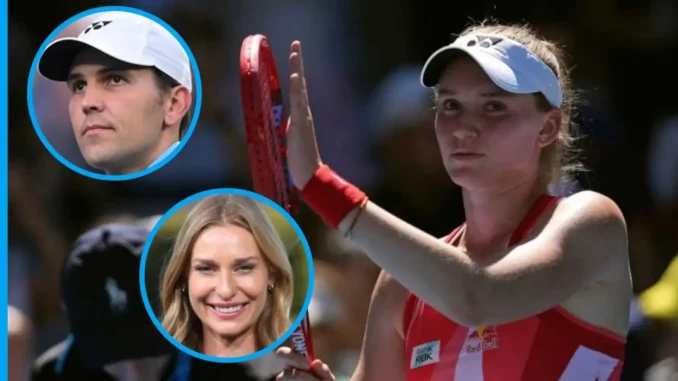
The world of professional tennis, a realm where fierce competition meets intense personal dynamics, has been shaken by a storm of accusations and counter-accusations. At the heart of this tempest is Elena Rybakina, a formidable force on the WTA tour, and her former coach, Stefano Vukov. The narrative, spun by a former WTA player, paints a picture of manipulation and control, a claim that has ignited a firestorm of debate within the tennis community.
The central allegation, that Rybakina was “brainwashed” by Vukov, is a stark and dramatic assertion. It suggests a level of influence that extends beyond the typical coach-player relationship, venturing into the territory of psychological manipulation. “It’s a very concerning situation,” the former player stated, her words carrying a weight of concern. “The dynamic appeared very unhealthy, and it seemed as though her own agency was being diminished.”
This claim raises profound questions about the power dynamics within professional sports, where the pursuit of excellence can blur the lines between guidance and control. The coach-player relationship is often a complex one, built on trust, respect, and a shared commitment to success. However, when that relationship becomes unbalanced, when one party exerts undue influence over the other, the consequences can be devastating.
The former WTA player’s assertion delves into the nature of Rybakina and Vukov’s interactions, suggesting that the coach’s influence extended beyond tactical advice and technical instruction. “It was as if her entire world revolved around his directives,” she elaborated. “There was a visible level of dependence that appeared very troubling.”
These claims have naturally elicited strong reactions, with some within the tennis community expressing skepticism, while others voice deep concern. Rybakina herself has, in the past, given indications of a very strong working relationship with Vukov. However, the current claims throw those past observations into a new light.
The concept of “brainwashing” is a loaded term, one that evokes images of coercive control and psychological manipulation. To apply it to a professional athlete, a person who has achieved remarkable success on the world stage, is a bold move. It suggests that Rybakina’s achievements, her victories, and her very identity, were somehow shaped by the will of another.
The implications of these accusations extend beyond the individual players involved. They raise broader questions about the role of coaches in professional sports, the ethical boundaries that should govern their behavior, and the responsibility of governing bodies to protect athletes from exploitation. The tennis world, like many other professional sports, is a high-pressure environment, where the pursuit of victory can sometimes overshadow the well-being of the athletes.
The conversations that have emerged due to these claims, also touch on the isolation that top level tennis players can experience. Traveling the world, and spending large amounts of time with a small support team can lead to very intense relationships. When those relationships become unhealthy, it can be very difficult for the athlete to find a way to make changes.
The idea that a player of Rybakina’s caliber could be subject to such influence is a stark reminder that even the most successful athletes are vulnerable to manipulation. The pursuit of greatness can create a dynamic where the athlete’s own voice is silenced, where their needs are subordinated to the demands of the coach.
The response from Rybakina and her current team will be closely watched. The tennis world is waiting to see how this controversy unfolds, and what steps, if any, will be taken to address the underlying issues that it has exposed. Whether these accusations will lead to any formal investigations, or whether they will simply fade into the annals of tennis gossip, remains to be seen. However, they have undoubtedly sparked a crucial conversation about the ethical responsibilities of coaches and the well-being of athletes.
Leave a Reply